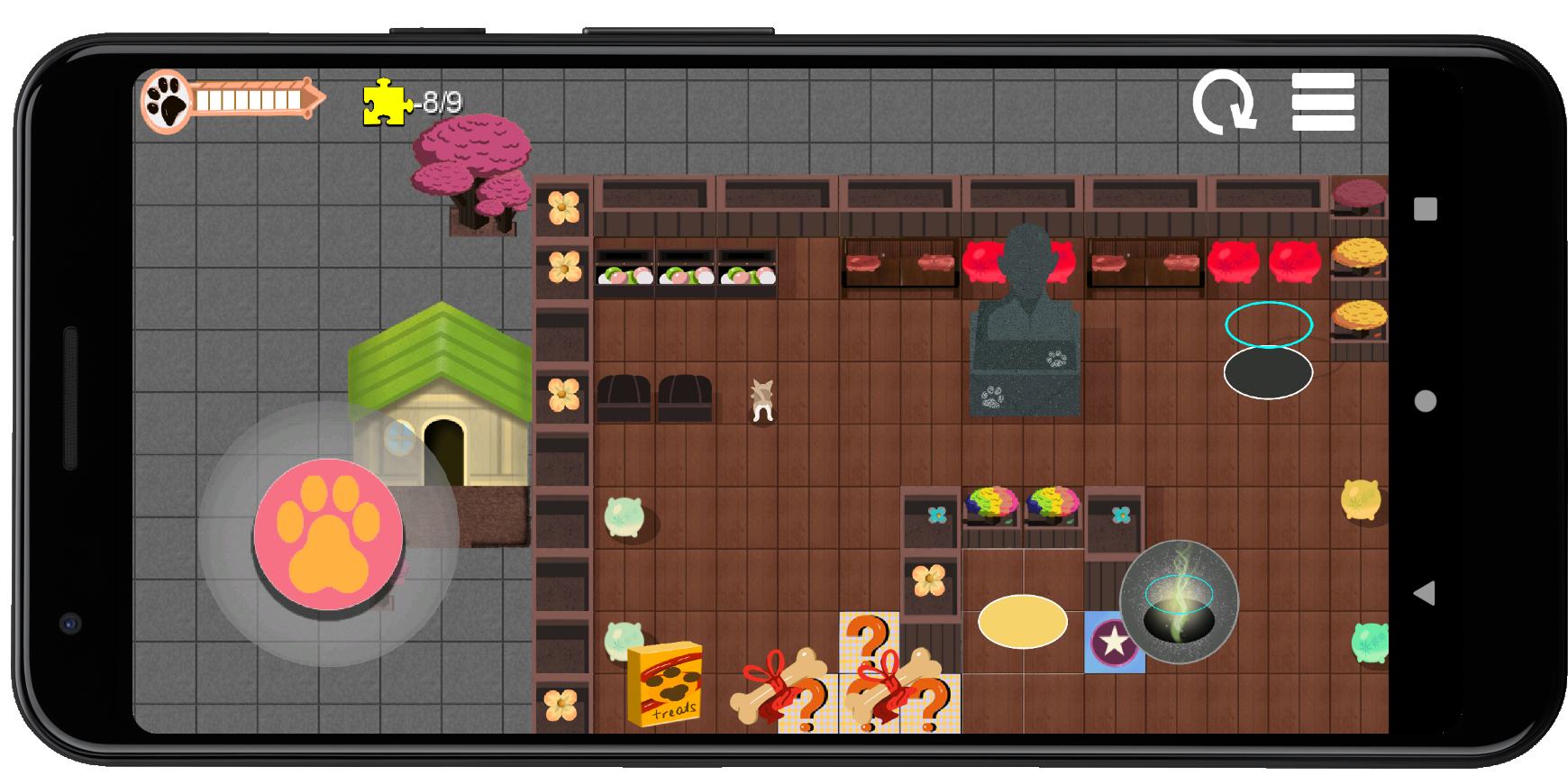
PawPuzzles
Game Design
Tools: Java + HTML + Javascript + Android Studio + Adobe Photoshop + Illustrator
August 2018 - Present
Game Design / Personal Project
Overview
Help Pal the puppy on his mission to escape the Paws Facility by solving various puzzle throughout each level.
Pawpuzzle is a 2D top-down platformer and puzzle game. Players navigate each level by utilizing resources to move objects around levels and collect key items that will be used to advance in the game.
METHODS
Design Ideation, User Testing, Prototyping.
ROLE
This was an individual project where I served a both designer and programmer for this game.
Project Context
This was a personal project in game design. The goal of this was to continue practice with the principles of game design and architecture following an intro to game design course.
Using Java and the badlogic library I tasked myself with creating the framework for a game designated for PC and mobile gameplay. Similar to my game design course, I was to utilize user feedback at each stage to aid in improving for the next iteration.
As a result, I came up with the concept for Pawpuzzles: a 2D top-down platformer and puzzle game where players must solve puzzles to advance gameplay.
1. Design Ideation
Brainstorming
During this stage of development I brainstormed the initial ideas for the game. I came up with 4 concept ideas. Summarily many of these concepts involved the following:
Top-down gameplay
Players must perform various tasks to unlock the next level
The player must obtain a “key“ to unlock the “door“ the next goal.
Ultimately I was particularly interested in the puzzle game genre because I wanted players to be able to think critically about their decisions within the game. Furthermore, I zoomed in one the idea of a jigsaw puzzle game. This initial concept was to create a fast paced jigsaw puzzle games where players can challenged themselves to solved puzzled within a set time limit.
Background Research
With the concept of a puzzle game in mind I researched various means of presenting the game.
https://www.jigsawplanet.com/
I explored the concept of timed jigsaw puzzle game where players must solve puzzles within the allocated time. I came across multiple site that accomplish this, including jigsawplanet.com and thejigsawpuzzles.com. Similarly these sites provide users with puzzles of varying difficulties that they can complete. The times aspect is incorporated in a community leaderboard where on each puzzle the users that complete the puzzle in the fastest time are ranked.
Ultimately, I thought the concept of the jigsaw game was too simple, and wanted to include more complexity within the scope of the puzzle experience. I still wanted to utilize the jigsaw aspect but include more.
Pokemon Ruby presents a top-down aspect of gameplay that I would like my game to mimic
Top-Down gameplay and Jigsaw puzzles
Going back to me earlier brainstorming session many of my ideas involved platforming gameplay. I began thinking of ways I could integrate the two. I drew inspiration from Pokemon Emerald, not necessarily for the gameplay but for how I wanted the visual top-down aspect of the game to look and feel.
2.Game Concept
Vision
Puzzles on Puzzles
The concept of this game involves two levels of puzzle solving:
Players must move objects around the game to make pathways toward advancing to the next level
Players must collect key items (Puzzle pieces) and then organize these items in a way to unlock the door to the next level
Objectives
Players must navigate around the various levels of the game picking up puzzle pieces. The first layer of puzzle-solving is understanding how to get to a piece because there might be obstacles in the way.
For example, large statues might block the path to a puzzle piece. To remove those obstacles, players can consume treats that can be found around the level.
These treats act as power-ups that will allow the player to move these large objects. The player must also avoid enemies that are set around the levels. The second layer of puzzle-solving is to organize all the puzzle pieces that the player has found into a complete image so that the next level can be unlocked.
Sketches & Wireframe
To began planning out the mechanics of the game I made gameplay sketches.
Puzzle Aspect #1
Player must get to the goal using their resources
The player must move obstacles out of their way to advance
This first aspect of the puzzle gameplay involves the player using a limited resource that will allow them to move objects out of the way. Once a clear path is set the player can make their way to the door.
Puzzle Aspect #2
Prior to arriving to the door, the player must collect puzzle pieces that must be used to unlock the door. Similar to the experience of solving a jigsaw puzzle, the player must organize these pieces to create the correct picture. Once this image is created the door will be unlocked.
A completed image will allow the player to advance to the following level. These two aspects of puzzle solving will help create complex and unique challenges for the player.
The overall look and feel of the game is driven by bright colors, particularly for the menu screen. This was done to perpetuate the jovial tone of the game. Most assets within the game deliver a cutesy sentiment to the overall gameplay experience.
Challenges
Limited resources
Enemies
Advancing through obstacles
Use key puzzle items to unlock next level - Players must collect all the puzzle pieces. Then they muse use the door puzzle slot to solve the puzzle and unlock the next level.
4. Prototype
Web Prototype - Kongregate & ITCH.IO
To test the initial
Android Prototype - Google Play Store






Android Screens
Text Design





Sprite Sheets






















